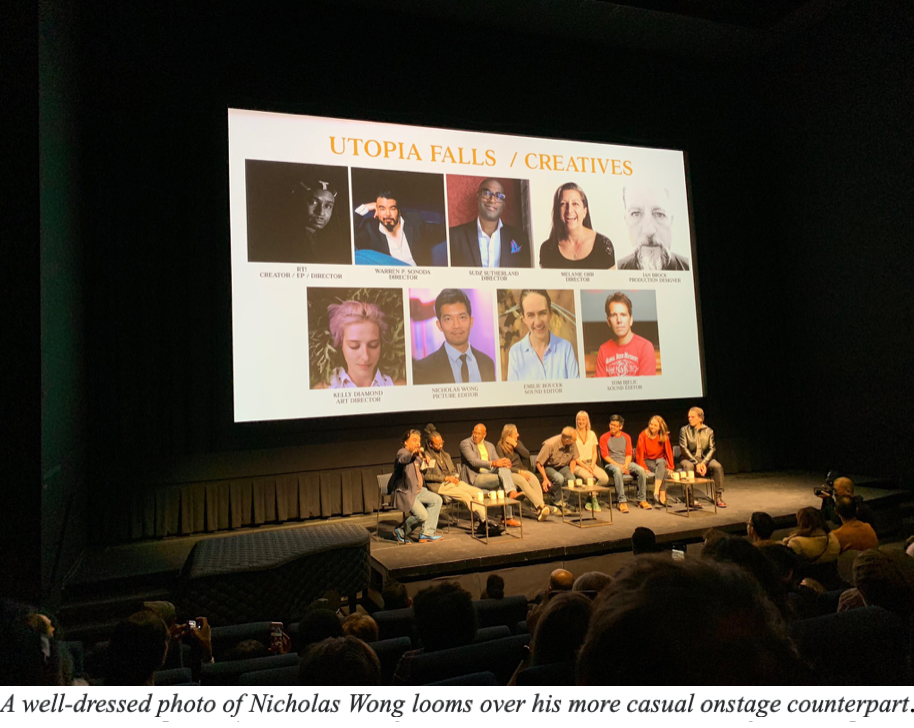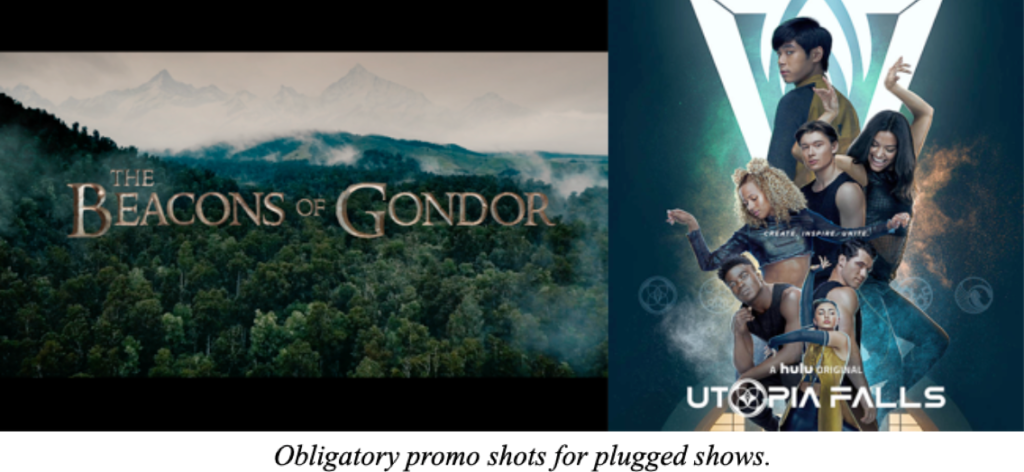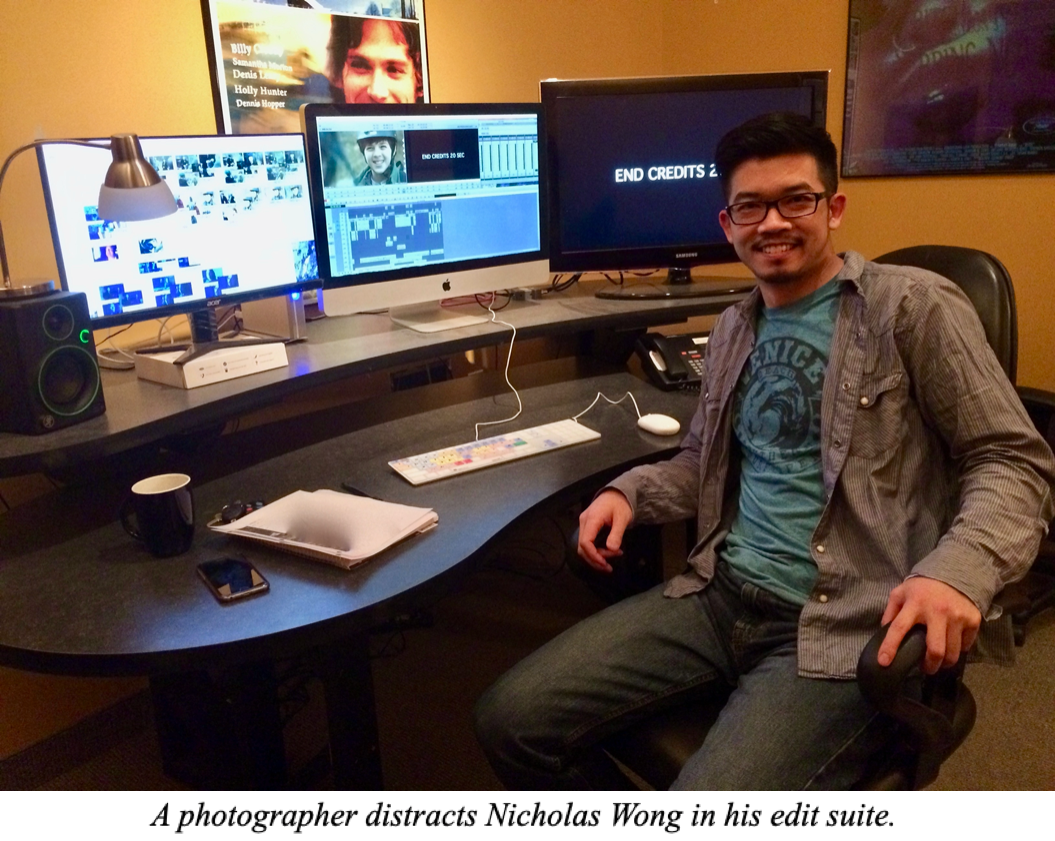Like many fellow Canadians of recent generations, Nicholas Wong came of age in the halls of the Degrassi franchise. Only in his case, he was literally on the Toronto set of the early 2000s “Next Generation” version of the long-running Cancon classic. Scoring an intern position at Epitome Pictures during his first year at Ryerson University, Nick fell in love with the editing process and was soon well on his way to becoming one of the most prolific an in-demand editors in the Eastern time zone.
Since graduating from Degrassi (where he ultimately assisted and cut over 100 episodes), Nick’s cutting has been seen on such TV favourites as Dark Matter, The Baroness Von Sketch Show and Hulu’s upcoming Utopia Falls as well as numerous features and shorts, winning multiple awards and praise along the way.
Like the rest of the industry, Nick has been furloughed as of late. Lucky for us, that left him with plenty of time to chat with us about all things film editing, upcoming shows and how the editing room will change post-COVID. Let’s dive right in!
How did your career in film editorial begin?
I had aspirations of becoming a filmmaker at an early age. After high school, I studied film production at Ryerson University. During my first year, I got an interning position in the post department of Epitome Pictures through a friend of a family friend, who was the senior editor there. They were producing a show called Degrassi. It was the first time I’ve ever been in a real working studio, with sets , lights and a backlot. It was all very overwhelming. I remember trying to drink from a water fountain and then realizing it was just part of a set and didn’t actually work!
One of the best things about Epitome, especially for a young filmmaker, was that everything was there in one place – from the edit suites, productions offices, writers rooms, and sets. It was a great way to see the whole process of producing a tv show from beginning to end.
As an intern, I was tasked with small jobs like organizing the tape library, making DVD dubs, videotaping casting sessions, etc. And whenever I had free time, I would go to set and watch directors like Bruce McDonald direct, or I would sit with the editors and watch them edit (One of the editors even let me cut a scene secretly)
As I proved my abilities, the company offered me a part-time position in the communications/publicity department. I started producing a series of short behind-the-scenes videos for Degrassi. I filmed and edited the short online videos, working closely with the producers. It was my first real job editing and I started developing an affinity for it.
When I finally graduated from Ryerson, an opportunity presented itself. One of the assistant editors was being upgraded to editor and they asked me if I wanted to become an assistant editor. I really enjoyed the work I was doing with the behind-the-scenes videos, and it was putting me on a path to possibly directing, but I ultimately took the assisting gig and I don’t regret it.
How did you make the transition from assistant to full-time Editor?
I’ve done a few other small assisting jobs before Degrassi. I worked on Dragon’s Den, importing footage into Avid. I did the night shift, while I was still working part-time at Epitome. I was also the online editor for the HD restoration of Anne of Green Gables and Road to Avonlea. The production company wanted to re-release these shows on Blu-Ray, but did not have EDLs (Edit Decision Lists) for the show, so I had to meticulously eye-match every shot to recreate the episodes! I did this at night, while working at Epitome during the day (I probably wouldn’t have the energy to do that today).
On Degrassi, the editors were my mentors. Not only did they teach me how to assist, they taught me how to edit. They gave me scenes to cut and they would spend time to talk about them with me after. The executive producers on the show were also very supportive and involved with starting my career. I was probably 19 when I started interning at the studio, so they’d seen my growth and the hard work I put into the show.
After a few years, I moved up from assistant editor to 1st assistant editor. And then one year, one of the editors was unavailable to finish an episode, so the producers asked if I wanted to take over locking that episode. I said yes. It was a good way for the producers to “test” me out. I must have not screwed up too badly, because shortly after I was given an episode of Degrassi and then the year after, I was given half a season to edit.
Becoming a freelance editor is a bit scary. Once a project ends, there’s always that fear of not working for a long time. I’ve been very fortunate. After Degrassi: Next Class ended, my next show was Dark Matter. I was recommended to the producers by an editor I assisted. And then after that, I was brought on to edit Creeped Out by Bruce McDonald, whom I worked with on Dark Matter. So it is sort of true that it’s all about who you know. But also, not just who you know, but who you’ve worked with.

What is your philosophy towards the cutting process?
I’ve tried to explain my cutting process and it’s very hard. haha. There’s just a lot of factors, and it be very contradictory sometimes. A lot of it comes from feeling, and how do you justify that when it’s so subjective?
That being said, my philosophy towards the cutting process comes a lot from emotion. No matter what genre I’m working on, when I tackle a scene, I first watch the dailies without distraction and I pay close attention to my emotions. How do I feel? Am I connected to the characters? Am I anxious, angry, or laughing? If I’m feeling something, that’s a good sign. Then I read the script and I ask what is the intention of the scene, does it match what I’m feeling. If so, great. If not, I try to find a way to manipulate the footage to try to make it match.
Also another little tip: editing was invented to fix problems. When you’re watching dailies and you don’t feel a need to edit, it’s a good sign that the scene is working.
Lastly, I like to look at the big picture. Sometimes, once all the scenes are assembled in order, and you watch it from beginning to end and nothing makes sense. It then requires structural changes. Making the big changes are just as important, if not more important than making the small ones.
Have you cut on other NLEs besides Avid?
I actually started with Premier when I was a kid, I used it for animation. When I got into university, we learned Final Cut. It was Final Cut for a while on Degrassi and then everything shifted to Avid when Final Cut X came out.
So far, mostly everything’s been Avid. It was just that one project, Code 8, that was on Premiere.
Have any projects taken you outside the Toronto area?
No actually. Everything has been in Toronto so far. The show that I’m working on coming up, Another Life, it shoots in BC, but edits in Toronto. You an edit anywhere, so it opens a lot of doors.
Do you have a favourite project/scene that you’ve cut?
I can’t really say I have a favourite project. There’s always an aspect I’m very proud of in all the projects I work on. Degrassi was my first editing gig and it will always have a special place in my heart. I loved working on Creeped Out. It’s a kid’s horror anthology series and I enjoyed that format. Unlike most TV, with an A plot, B plot and C plot, this was all A plot, so each episode felt more like a movie.
I edited Blood and Water, the first Canadian trilingual series with scenes in English, Cantonese and Mandarin. For the first time, being able to understand Cantonese proved to be fairly useful, and it was nice to feel a sense of pride for my Chinese heritage.
And of course, Baroness Von Sketch Show was just so fun to work on. My favourite sketches I’ve cut are Car Snacks, Not Sisters, and Did It Help.
Your IMDB profile includes several directing credits on shorts. Do you plan to direct again?
I think someday in the future I might want to direct. At the moment, I’d probably want to do something I’d written. Probably just do something that’s closer to my heart, something that’s more personal.
At this moment, I’m kind of focused on editing. I’m really enjoying it right now so that’s where I’m trying to hone my skills.
How has your work been affected by COVID?
Everything’s kind of shut down. The whole industry’s on pause. I was supposed to start a show for Netflix and everything just shut down. There is talk about it starting up again in late July.
The good thing about Post is that we’re already kind of quarantined. Everyone’s working separately in their own rooms. An extra bit of precaution we’re now doing is, because we do edit out of a post house, the post house is taking extra precautions on cleaning everything everyday. The assistants who shared a room are going to now have separate rooms. When we’re working with directors, we’re going to be working remotely so no interacting in person.

Tell us more about your recent projects Beacons of Gondor and Utopia Falls.
Beacons of Gondor is this comedy series. It’s a couple friends who have this comedy troupe and they do a lot of sketches. So one of the sketches is kind of a Lord of the Rings parody. They made all the costumes for the Orcs and they shot it in the forest. When they approached me, they showed me some stills of it and it just looked so good with the atmosphere that they had and the lighting so I thought it would be a fun project to work on.
Utopia Falls is a Hulu series about a group of teenagers in this post-apocalyptic city and they slowly discover that there’s a hidden art form which is rap music and it’s been oppressed by society because it’s been seen as a danger to society. It’s about them uncovering this truth about this world.
Any advice for aspiring editors?
There are many ways of becoming an editor and everyone has their own path. Some people go the assistant route, but there are others who just edit a lot of short films and expand their contacts that way. I would say to reach out to editors, especially if you want to go the assistant route, start a relationship with them. Look into unions if you want to do scripted shows (bigger budget shows are usually unionized).
In Ontario, editors are part of the DGC. In BC, editors are part of IATSE. Unions have a lot of resources to find out what’s in production, some you can access for free on their websites. It’s also a good way to find contacts for other editors too. Reach out to directors and start editing as much as you can. I appreciate books on editing, but I also think you really need to discover editing for yourself.

